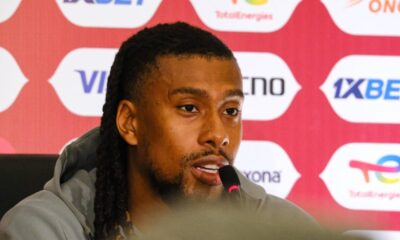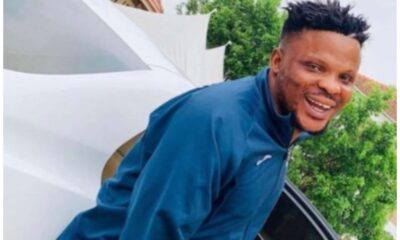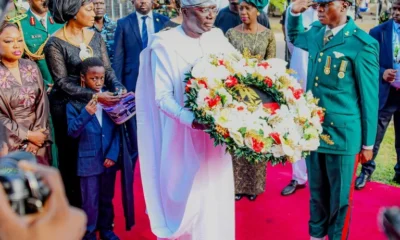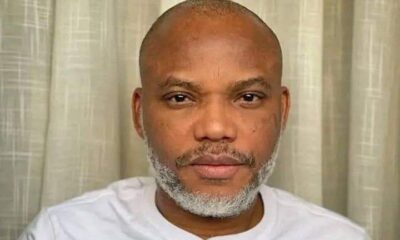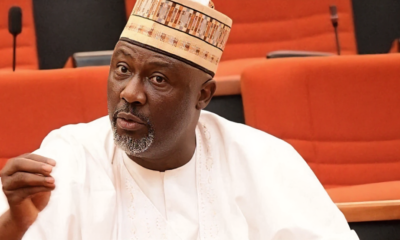Columns
Why Nigeria’s maritime cadets still struggle with global certification – NSML MD
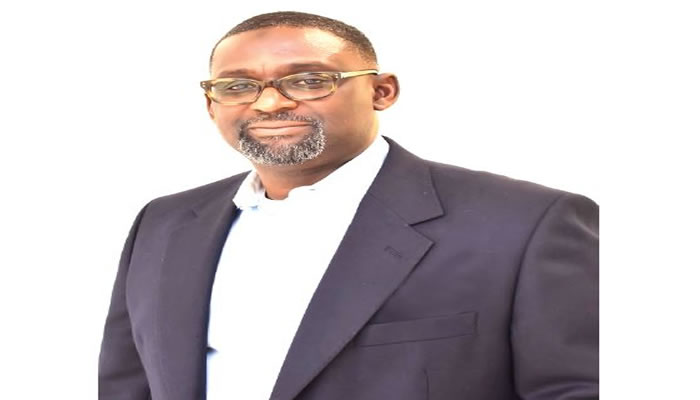
In this interview, with ANOZIE EGOLE, the Managing Director of the NLNG Shipping and Marine Services Limited, Mr. Abdulkadir Ahmed, speaks on the challenges with the Nigerian Seafarers Development Program, among others
You said 2024 was a good year for NSML. Can you tell us how?
I can tell you it was our best year, whether from a profitability point of view or an operations point of view. But actually, what we are even most proud of is that it was our best year from a safety point of view. For us, the profitability bit is just on the side, it’s what we call the icing on the cake. We are in business primarily to deliver on those core tenets of why we were set up. To run a safe business, provide safety, ensure the assets under us are managed reliably so that they can be available, and create value. Now, value isn’t just about finances. Value is the service that we provide to our customers, to our stakeholders. So when we say it was our best year, it was our best year financially, but most importantly, it was our best year operationally and safety-wise.
To what extent have you achieved your Nigerianisation policy?
We have a Nigerianisation objective or goal that we have defined a very long time ago. We are a Nigerian company and, of course, we were created to provide opportunities for Nigerian seafarers to participate in the Liquefied Natural Gas shipping industry. So we defined a Nigerianisation objective, which is that we want to have, at every moment, 85 per cent of our crew onboard our vessels, Nigerians, across all cadres. Again, it’s about ensuring that we are open to the world. The shipping industry, by its nature, opens up to the world. When I talk about standards, it’s a global standard. And you want to have a cross-fertilisation of cultures, of ideas. I hope you understand what I’m saying. So that was why we kept 15 per cent, to say we would have other nationalities. And today, we have Polish, Ukrainians, Indians, Malaysians, and Filipinos, on our vessels. And it helps, when you go there, it’s one family, everybody is an NSML staff. You don’t have NSML Nigerian staff, everybody is NSML staff. They go on board, they work together, they collaborate, they run the vessels, and they run them professionally. We were able to attain our 85 per cent two years ago. So, for example, people will leave, that’s normal, people will be promoted, and we will have additional vessels to manage. We have been growing our vessels under management consistently. We just took a new, advanced mega vessel, called Axios, It’s a mega vessel. It’s a sister vessel of the Arcturus. Remember the Arcturus that we took last year? So we took a new one, just last month. We took a new vessel under our management. And it’s something we’re proud of. It’s one of the most advanced LNG vessels in operation in the world today. We are one of the few, as small as we are, of the few, technical ship managers with that kind of vessel under management. And we are providing opportunities for Nigerians to sail on those vessels. So, from a Nigerian point of view, we are very happy with where we are, as a company. We have met our targets; we aim to exceed those targets. But from the office side, we are 100 per cent Nigerians in the office. The entire leadership, the entire crew, and the staff members in the office are Nigerians.
Tell us more about the cadetship program?
Now, the Nigerian Maritime Administration and Safety Agency is the co-sponsor of Nigerian cadets, under the Nigerian Seafarers Development Program. Part of their certification program is to go on board, and have their sea time and that is a very fundamental aspect of their certification. So they go to the colleges first, then they go on board, and then they go back to the colleges for their final exams. So we, in conjunction with NMASA, have been one of the most consistent, in terms of providing sea time, for Nigerian cadets. So far, almost 300 cadets have sailed on our vessels, and we take this very seriously. Because it is in line with the desire to deepen the Nigerian maritime sector. We are one of the few companies with ocean-going vessels in Nigeria today. We are the only LNG technical management company, I dare say, in Sub-Saharan Africa today. So the opportunity that we give them to be on those vessels is top-notch. But most importantly, it is also a funnel for us. They come on our vessel, they train on our vessel, and we imbibe them with our standards, with our culture. And they go back to their colleges, and finish, and we can also, where the opportunities are, recruit from that group. And so far, almost 100 have been recruited within NSML. So we are very proud of that. I am sure some of you were here when we had the induction program for the Romanian Cadets, and those are people who unfortunately went to Romania and finished, but unfortunately, their certifications were not recognised. We stepped in to provide a solution to NIMASA, which is simply that they will go on our vessels, and I think about 65 of them are already on the vessels. They are about to finish their sea time, and then they will go to a maritime academy in the United Kingdom for their certification. So we are exploring multiple ways, to provide solutions and provide opportunities.
Tell us about your collaboration with the Maritime Academy of Nigeria, Oron?
Now we collaborate with the Maritime Academy of Nigeria, Oron. In 2014, if I remember correctly, we actually went to the school, evaluated their curriculum, identified their needs, and supported the upgrading of their facilities then. Some of our top management today all went to the maritime academy. The first Nigerian LNG Captain went to a maritime academy. We got him from there, and we sent him on further courses. So we have a good relationship with the maritime academy. And currently, we have even developed a program where we’re taking their cadets for industrial attachments. I think currently we have about 20 students from the school on industrial attachment, and this is the first time we are taking students on that from MAN, Oron. All to ensure that we provide a platform for their training and development. Now, there is a fundamental problem, but then, we are all in business to solve problems. The problem is the certification, the NMASA-accredited certification. Unfortunately, the NMASA-accredited certificate is not recognised internationally for ocean-going. So, maritime academies, as good as they are, in terms of their facility and their curriculum, at the moment, we do have a certificate recognition problem. But that’s something that we are discussing, and we are working with NMASA to find a way to resolve that. It’s more of an organisational issue than anything else. It’s not a quality issue. Let me be very frank, it’s not a quality issue; it’s a quality assurance issue. I hope you understand what I am saying. I may believe you are good. But my word would not count for somebody else. Somebody needs to have said, okay, what is the assurance process to ensure, you are good today, and you will be good tomorrow. And that is where the discussion with NMASA is going on. How do we support NMASA to upgrade their systems, their processes, to ensure others internationally can come in and say, yes, we believe, and we assure ourselves that your systems and processes of accreditation are good? It’s just a matter of perception. So those works are still ongoing. Unfortunately, because we are ocean-going, our vessels call at various international destinations. We cannot have NMASA-trained officers with Certificate-of-Competency on those vessels yet, because those certifications are not fully accepted internationally yet. But we are working towards that. We can resolve the ratings certification.
Is it safe to say that with your certification, you can take and train cadets on your own?
There’s a Maritime Academy, which is the baseline. That’s the baseline institution for the provision of maritime training. The Maritime Centre of Excellence is an Advanced Marine Training Institute. So, it’s like going to university, let’s put it to university, they are the only ones that will issue you a degree certificate. But with all the necessary certifications to ensure that your degree remains relevant and up to date, you can go to other institutes. That’s what MCOE is. So, we are not competing with the Maritime Academy or other maritime institutions. No. We are rather complementary. They are the ones that provide the basic training and COC certification. What then happens is that the additional courses over and above what you can achieve, which we are seeing now, have been accreted for a couple of those courses. And that’s what MCOE aims to be: an advanced maritime training institute that can provide advanced maritime certification in specific courses. Then we aligned ourselves with the MCA. The MCA is the UK Coast Guard and Marine Agency. They are accredited; it’s deemed to be the gold standard of maritime certificate accreditation in the world today. So, we have a partnership with an institution in the UK. The plan in place this year is to upgrade the MCOE both in terms of facility, resources, and courses so that the centre itself is 100 per cent accredited by the MCA. And what we then intend to do in doing such is that anybody who is a seafarer who needs advanced certification doesn’t have to go to the UK or anywhere else to go and get that today, they can come to MCOE. Like I said, it’s, again, it’s a plan, we haven’t implemented. First of all, we have to upgrade the centre, but we have started. Part of that is that we have achieved accreditation of two courses. They have done an audit of our facility. They have identified the things that we need to do. We need to have more. They have acknowledged what we have, and that’s why they have accredited those two courses. But we want to go beyond specific course accreditation. We want to go for full centre accreditation, which is why we are upgrading the facility. We are increasing the courses and the resources provided to MCOE to be able to do that.
You don’t need to go anywhere to go and do it, you can come to Bornny and do it, and it’s as good as you have gone to the UK to do it. MCOE doesn’t provide the COC what we are providing is, when you have the COC, is the additional certification. For example, the COC will not give you a basic tanker course.
Columns
Important Facts About Adegoke Adelabu – “The Lion of the West” (1915–1958)
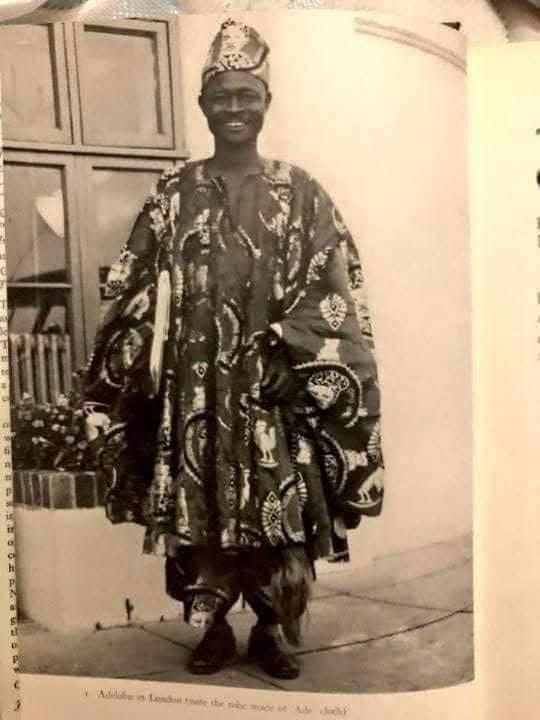
Full Name: Alhaji Adegoke Gbadamosi Adelabu
Birth Name: Gbadamosi Adegoke Akande
Date of Birth: 3 September 1915
Place of Birth: Ibadan, present-day Oyo State, Nigeria
Nickname: “The Lion of the West” — a title earned for his fearless, combative, and charismatic political style
Education:
St. David’s School, Kudeti, Ibadan (1925–1929)
Government College, Ibadan (from 1936)
Yaba Higher College (admitted on scholarship)
Intellectual Reputation:
Adelabu was renowned for his exceptional oratory, sharp intellect, and ideological boldness, making him one of the most formidable politicians of his generation.
Popular Alias:
Known among his largely non-literate supporters as “Penkelesi” — a Yorubanised version of “peculiar mess”, a phrase he frequently used in speeches, which became inseparably associated with him.
Political Affiliation:
A leading member of the National Council of Nigeria and the Cameroons (NCNC) under Dr. Nnamdi Azikiwe during the colonial era.
Political Rivalry:
He was a fierce and ideological opponent of Chief Obafemi Awolowo in the Western Region, making Western Nigerian politics highly competitive and polarized in the 1950s.
Colonial-Era Persecution:
Adelabu is widely regarded as one of the most persecuted opposition politicians of the colonial period, having faced about 18 court cases, many believed to be politically motivated.
Corporate Achievement:
He made history as the first African General Manager of the United Africa Company (UAC), a major British trading firm, marking a significant breakthrough for Africans in colonial corporate leadership.
Death:
Date: 25 March 1958
Place: Ode-Remo, Ijebu Province (present-day Ogun State)
Cause: Fatal motor accident involving his Volkswagen Beetle, alongside a Lebanese business associate and two relatives
Age at Death: 43 years old — two years before Nigeria’s independence
Family:
At the time of his death, Adelabu had 12 wives and 15 children, reflecting the social norms of his era.
Aftermath of Death:
His sudden and tragic death sparked widespread riots and unrest across Ibadan, underscoring his immense popularity and political influence among the masses.
Historical Significance:
Adelabu remains one of the most charismatic, controversial, and intellectually formidable politicians in Nigerian pre-independence history, often remembered as a symbol of radical opposition politics and mass mobilisation.
Source:
Nigerian political history archives
Ibadan colonial-era political records
Biographical accounts on Adegoke Adelabu
Yoruba political history documentation
Columns
Pentecostal Evangel Sparks a Great Revival in Nigeria, 1930s
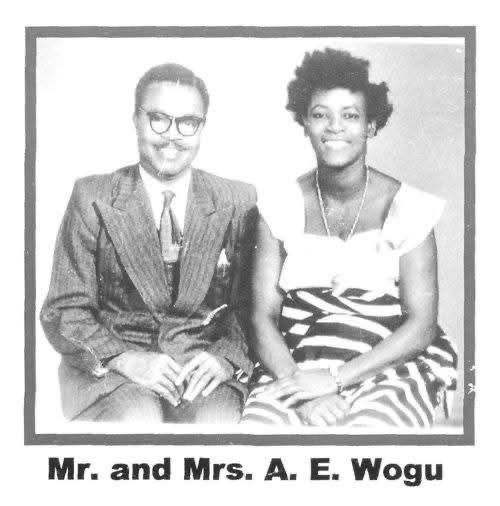
The pioneering role of Mr and Mrs A. E. Wogu in the rise of indigenous Pentecostalism
The explosive growth of Pentecostal Christianity in Nigeria during the twentieth century did not emerge overnight. Long before megachurches, crusade grounds, and global ministries, the movement was shaped by small prayer groups, radical faith, and indigenous leaders who believed that Christianity in Africa must be spiritually vibrant and culturally rooted. Among the most influential of these pioneers were Mr and Mrs Augustus Ehurie Wogu, whose quiet but profound work in Eastern Nigeria helped spark what later became one of the most significant religious revivals in Nigerian history.
By the 1930s, Nigeria was already experiencing religious ferment. Dissatisfaction with mission churches, hunger for spiritual power, and the search for an African-led Christian expression created fertile ground for Pentecostal ideas. It was within this context that the Wogus emerged as key catalysts of renewal.
Augustus Ehurie Wogu: Faith and Public Life
Augustus Ehurie Wogu (A. E. Wogu) was not a cleric by training. He was a respected civil servant, educated and deeply rooted in Christian discipline. Like many early revivalists, his spiritual influence came not from formal ordination but from conviction, prayer, and leadership within lay Christian circles.
At a time when colonial society often separated public service from spiritual enthusiasm, Wogu embodied both. His faith was intense, practical, and unapologetically Spirit-filled. He believed that Christianity should be marked by holiness, prayer, divine healing, and the active presence of the Holy Spirit—beliefs that resonated deeply with many Nigerians who felt constrained by the formality of mission Christianity.
The Pentecostal Spark: Print, Prayer, and Providence
One of the most remarkable aspects of the Nigerian Pentecostal revival was how it was ignited. Rather than beginning with foreign missionaries, the movement was sparked through printed Pentecostal literature.
In the early 1930s, Wogu and other like-minded believers encountered Pentecostal Evangel, a magazine published by the Assemblies of God in the United States. The publication circulated testimonies of revival, Spirit baptism, divine healing, and missionary zeal. For Wogu and his associates, this literature provided language and theological grounding for experiences they were already seeking.
Inspired, they began intense prayer meetings, fasting, and Bible study sessions in their homes. These gatherings soon attracted others hungry for deeper spiritual life.
The Wogu Home as a Revival Centre
The home of Mr and Mrs Wogu in Umuahia, present-day Abia State, became one of the earliest hubs of Spirit-filled Christianity in Eastern Nigeria. It functioned as:
A prayer house
A teaching centre
A refuge for believers seeking healing and renewal
These meetings were marked by fervent prayer, testimonies, and an emphasis on personal holiness. Importantly, leadership was indigenous. Nigerians taught, prayed, interpreted scripture, and organised fellowships without missionary supervision.
This approach helped dismantle the idea that spiritual authority had to come from Europe or America.
Mrs Wogu and the Role of Women in Early Pentecostalism
While historical narratives often foreground male leaders, Mrs Wogu played a crucial role in sustaining and expanding the revival. She provided spiritual support, hospitality, organisational stability, and mentorship—functions that were essential to the survival of early Pentecostal fellowships.
Her partnership with her husband reflected a pattern later seen across Nigerian Pentecostalism, where women played powerful but often understated roles as prayer leaders, organisers, and spiritual anchors.
From Fellowship to Movement: Birth of Assemblies of God Nigeria
As the revival grew, correspondence began between Nigerian believers and the Assemblies of God in the United States. This relationship eventually led to the arrival of American missionaries in the late 1930s.
Crucially, because the movement already existed before foreign involvement, the resulting church developed with a strong indigenous identity. This distinguished Assemblies of God in Nigeria from many earlier mission-founded churches.
The values emphasised by Wogu and his peers—local leadership, spiritual experience, and African agency—became foundational to the denomination’s growth.
Impact on Nigerian Christianity
The legacy of Mr and Mrs A. E. Wogu extends far beyond Umuahia or the Assemblies of God denomination. Their work helped shape:
The broader Pentecostal and Charismatic movement in Nigeria
The idea that revival could emerge from African initiative
The theology of prayer, healing, and Spirit baptism that dominates Nigerian Christianity today
Many of Nigeria’s most influential pastors and evangelists trace their spiritual heritage, directly or indirectly, to the revival culture of the 1930s.
A Lasting Legacy
A photograph dated 29 March 1959, showing Mr and Mrs A. E. Wogu, captures not just a couple but a generation of believers whose faith reshaped Nigeria’s religious landscape. By that time, the movement they helped ignite had grown beyond imagination.
Their story reminds us that history is often made not only by those on pulpits or platforms, but by faithful individuals who open their homes, pray persistently, and dare to believe that renewal is possible.
Sources
This Week in AG History
Assemblies of God Nigeria historical archives
Ogbu Kalu, African Pentecostalism: An Introduction
J. D. Y. Peel, Religious Encounter and the Making of the Yoruba (contextual reference)
Nigerian church
Columns
Theophilus danjuma
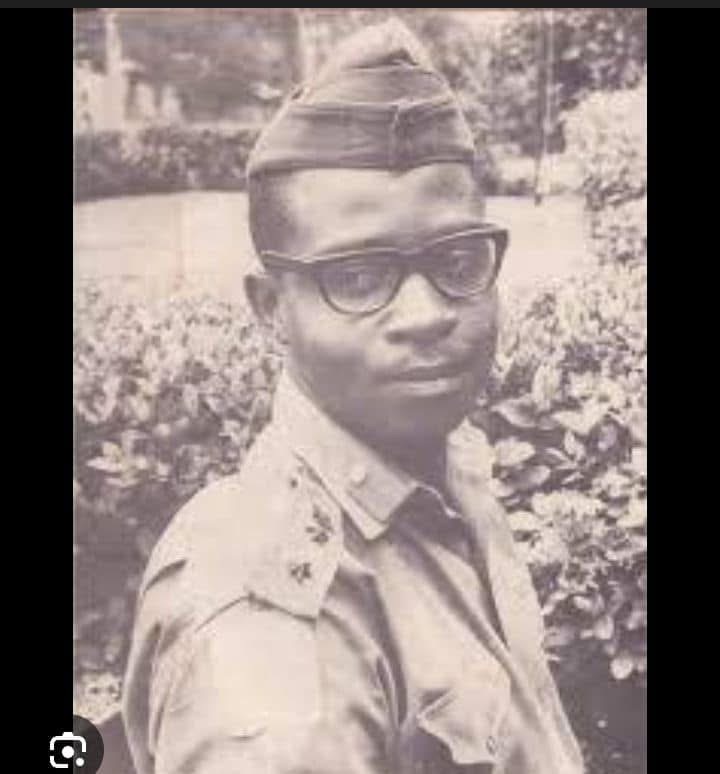
Lieutenant General Theophilus Yakubu Danjuma GCON ) is a retired Nigerian @rmy officer, billionaire businessman, and prominent philanthropist. He is considered one of Nigeria’s most influential and controversial milit@ry figures, having played a central role in several key events in the country’s post-independence history.
Born in Takum, Taraba State on December 9, 1938 , from a humble farming family.
He Attended St. Bartholomew’s Primary School and Benue Provincial Secondary School.
He received a scholarship to study history at Ahmadu Bello University but joined the Nigerian Army in 1960, the year Nigeria gained independence.
Commissioned in 1960, he served as a platoon commander in the Congo Crisîs and rose to the rank of Captain by 1966.
He is widely recognized for leading the troops that arrested and overthrew the first military Head of State, General Aguiyi-Ironsi, during the July 1966 counter-coup.
He served as the Chief of @rmy Staff from 1975 to 1979 under the milit@ry göverñmëñts of Murtala Muhammed and Olusegun Obasanjo.
After returning to public service in the democratic era, he served as Nigeria’s Minister of D£fence from 1999 to 2003 under President Obasanjo.
After returning to public service in the democr@tic era, he served as Nigeria’s Ministēr of Defēñce from 1999 to 2003 under President Obasanjo.
Following his military retirement in 1979, Danjuma became one of Africa’s wealthiest individuals through ventures in shipping and petroleum.
He owns NAL-Comet Group, A leading indigenous shipping and terminal operator in Nigeria.
Owns NAL-Comet Group, leading indigenous shipping and terminal operator in Nigeria.
South Atlantic Petroleum (SAPETRO): An oil exploration company with major interests in Nigeria and across Africa.
In 2009,he established TY Danjuma Foundation: with a $100 milliøn grant, it supports education, healthcare, and pôverty alleviation projects throughout Nigeria.
As of early 2026, he remains an active elder statesman, having celebrated his 88th birthday in December 2025.
He continues to be a vocal crìtic of Nigeria’s security situation, recently urging citizens to “rise up and DEFĒÑD themselves” against b@nditry and in$urgēncy when gøvernmēñt protection f@ils.
He remains a “towering national figure” in Taraba State, where he has recently toured ongoing construction for the T.Y. Danjuma University and Academy.
Danjuma is celebrated as a figure who transitioned from milit@ry leadership to business and philanthropy, significantly impacting Nigeria’s development.
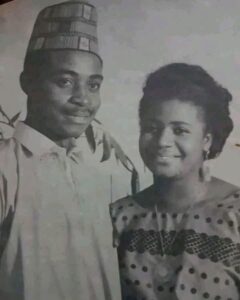
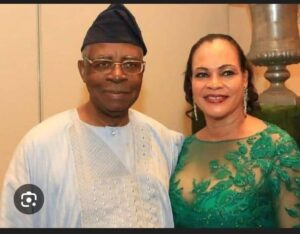
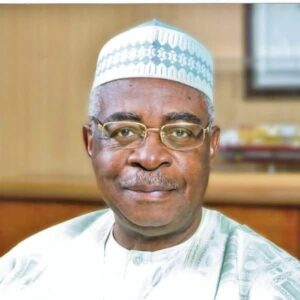
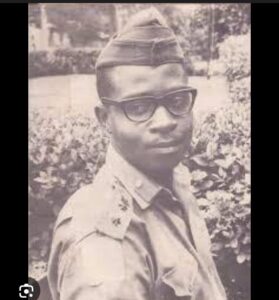
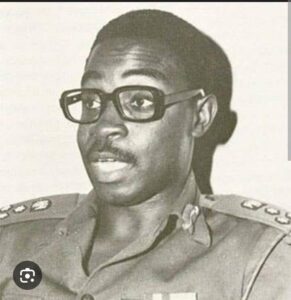
-
Business1 year ago
US court acquits Air Peace boss, slams Mayfield $4000 fine
-

 Trending1 year ago
Trending1 year agoNYA demands release of ‘abducted’ Imo chairman, preaches good governance
-

 Politics1 year ago
Politics1 year agoMexico’s new president causes concern just weeks before the US elections
-

 Politics1 year ago
Politics1 year agoPutin invites 20 world leaders
-

 Politics1 year ago
Politics1 year agoRussia bans imports of agro-products from Kazakhstan after refusal to join BRICS
-
Entertainment1 year ago
Bobrisky falls ill in police custody, rushed to hospital
-
Entertainment1 year ago
Bobrisky transferred from Immigration to FCID, spends night behind bars
-
Education1 year ago
GOVERNOR FUBARA APPOINTS COUNCIL MEMBERS FOR KEN SARO-WIWA POLYTECHNIC BORI

